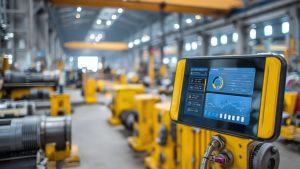Integrating modern technology is crucial for manufacturing companies in today’s industrial landscape. It’s how businesses not only stay competitive but also excel. Revolutionizing manufacturing and engineering involves shifting mindsets, strategies, and technologies. Advancements like synthetic intelligence (AI), the Internet of Things (IoT), and sustainable practices are reworking sectors. I’ll share insights and real-world examples of this variation.
Table of Contents:
- 1. The Rise of Smart Factories
- 2. Integrating AI and Machine Learning
- 3. Prioritizing Sustainability
- 4. Revolutionizing Manufacturing and Engineering: Embracing Advanced Materials
- 5. The Digital Transformation: Industry 4.0
- 6. AI-Powered R&D
- Conclusion
1. The Rise of Smart Factories
Smart factories use interconnected systems and data analytics to optimize production processes. They leverage technologies and software solutions for improved decision-making. I recently toured a factory where digital sensors monitored machine function in real-time.
The sensors even ordered raw materials automatically. The impact on productivity and efficiency was striking. Benefits include more desirable performance, decreased downtime, and improved product pleasantness. Companies are adopting smart manufacturing gadgets and leveraging real-time information sharing among equipment and systems.
2. Integrating AI and Machine Learning
Artificial intelligence (AI) and machine learning are significantly impacting production. AI and device studies permit manufacturers to deal with problems proactively for smoother operations. This spans predictive maintenance, quality control, and supply chain optimization.
McKinsey research predicts that AI-driven design tools will dramatically boost efficiency and accuracy. They could cut design time by half and boost precision by almost a third. This includes everything from chatbots for better customer service to algorithms for preventing product defects.
3. Prioritizing Sustainability
Sustainable production practices are becoming essential for producers. They’re now not only a trend but an expectation. Sustainability appeals to eco-aware clients, and it involves creating new methods.
Companies must integrate renewable energy, reduce waste, and maximize recycling. Focusing on the product lifecycle helps minimize environmental impact. Sustainable practices also contribute to improved brand image and reduced costs.
4. Revolutionizing Manufacturing and Engineering: Embracing Advanced Materials
A materials revolution is underway, involving the creation of new materials with enhanced properties. Carbon fiber transformed car manufacturing, and this innovation continues. Scientists are developing light yet strong composites that outperform traditional metals.
I recently learned about automating composite production. The Oak Ridge National Laboratory advances materials science, improving how we design and manufacture products. These improvements cause higher-acting products and lower production costs.
5. The Digital Transformation: Industry 4.0
Industry 4.0 integrates digital technology like IoT, AI, and cloud computing into manufacturing. Supply chain management can instantly adjust to disruptions, and machinery can auto-correct issues. Industry 4.0 enables data analytics for a data-driven approach.
The key effects of digitalization are optimized processes, improved quality, and reduced costs. Computer-aided design (CAD) and product lifecycle control (PLM) similarly enhance these blessings. This transformation allows producers to stay competitive and agile.
6. AI-Powered R&D
AI is transforming research and development (R&D). It accelerates product design and leverages data analytics. Time-to-market decreases, along with product testing costs. A data-driven approach optimizes production lines and product processes.
The Financial Times highlights how AI is turbocharging innovation. This provides manufacturers with a competitive edge. Such tools empower businesses to outperform competitors, especially with efficient production processes and addressing skilled labor shortages.
Conclusion
Revolutionizing manufacturing and engineering is no longer a distant goal—it’s a current reality driven by engineering solutions and cutting-edge technologies. Smart factory systems, generative AI, sustainable practices, advanced materials, and design software are transforming industries by improving efficiency, precision, and adaptability in manufacturing processes. These innovations not only streamline operations but also enable companies to remain competitive in an increasingly dynamic market.
The integration of these technologies fosters operational excellence by reducing waste, cutting costs, minimizing downtime, and boosting financial performance. Generative AI plays a key role in enhancing product design and development, enabling manufacturers to create more innovative solutions while improving supply chain logistics. Advanced design software ensures accurate modeling and simulation, reducing errors and accelerating production timelines.
Moreover, the focus on continuous improvement in manufacturing processes empowers organizations to adapt to evolving demands, maintain high-quality standards, and build resilience against supply chain disruptions. Skilled labor, supported by advanced tools and strategies, enhances productivity while addressing potential issues with raw materials and production bottlenecks.
By embracing these technological advancements and innovative strategies, manufacturing professionals and businesses position themselves for long-term success. They not only shape the future of the industry but also pave the way for sustainable growth, stronger supply chains, and more efficient operations, ensuring leadership in this rapidly evolving field.



